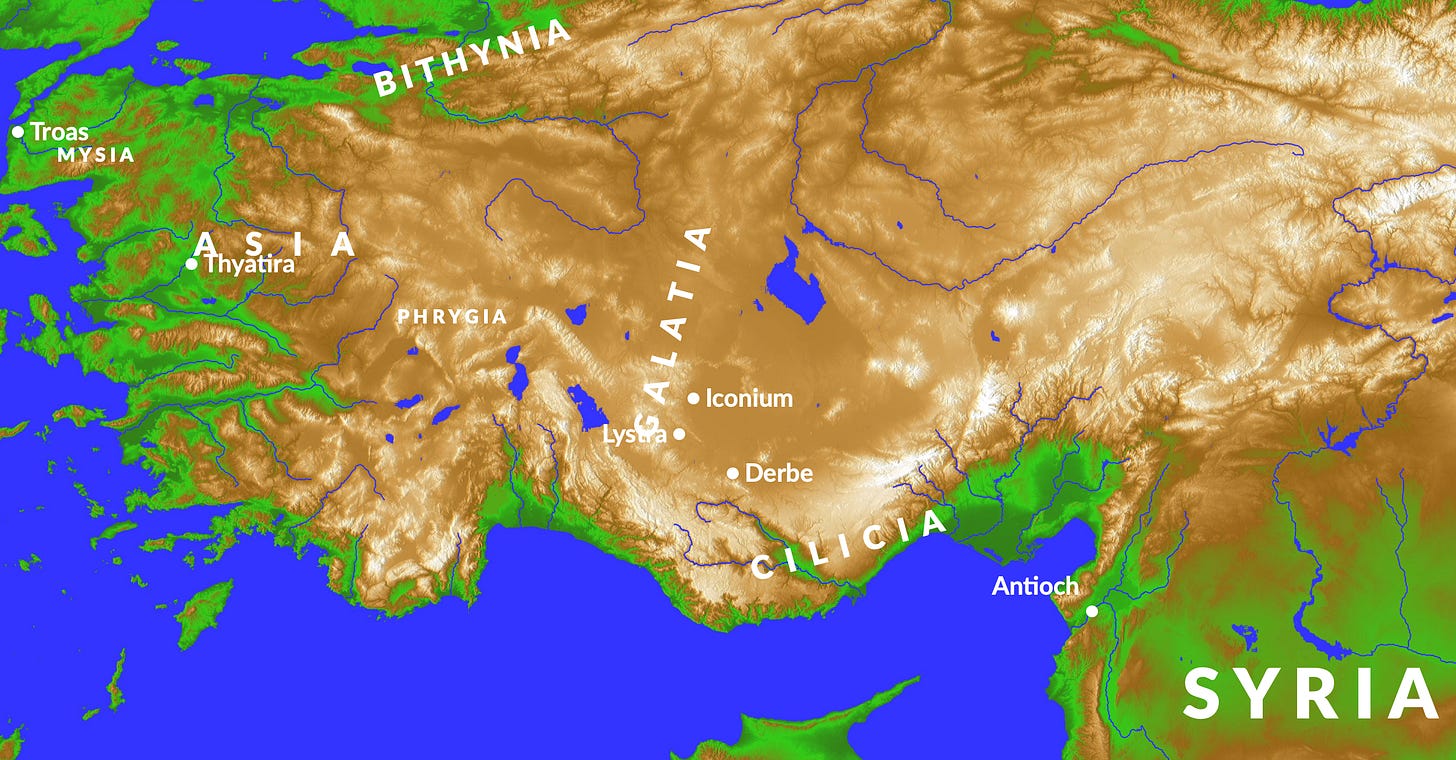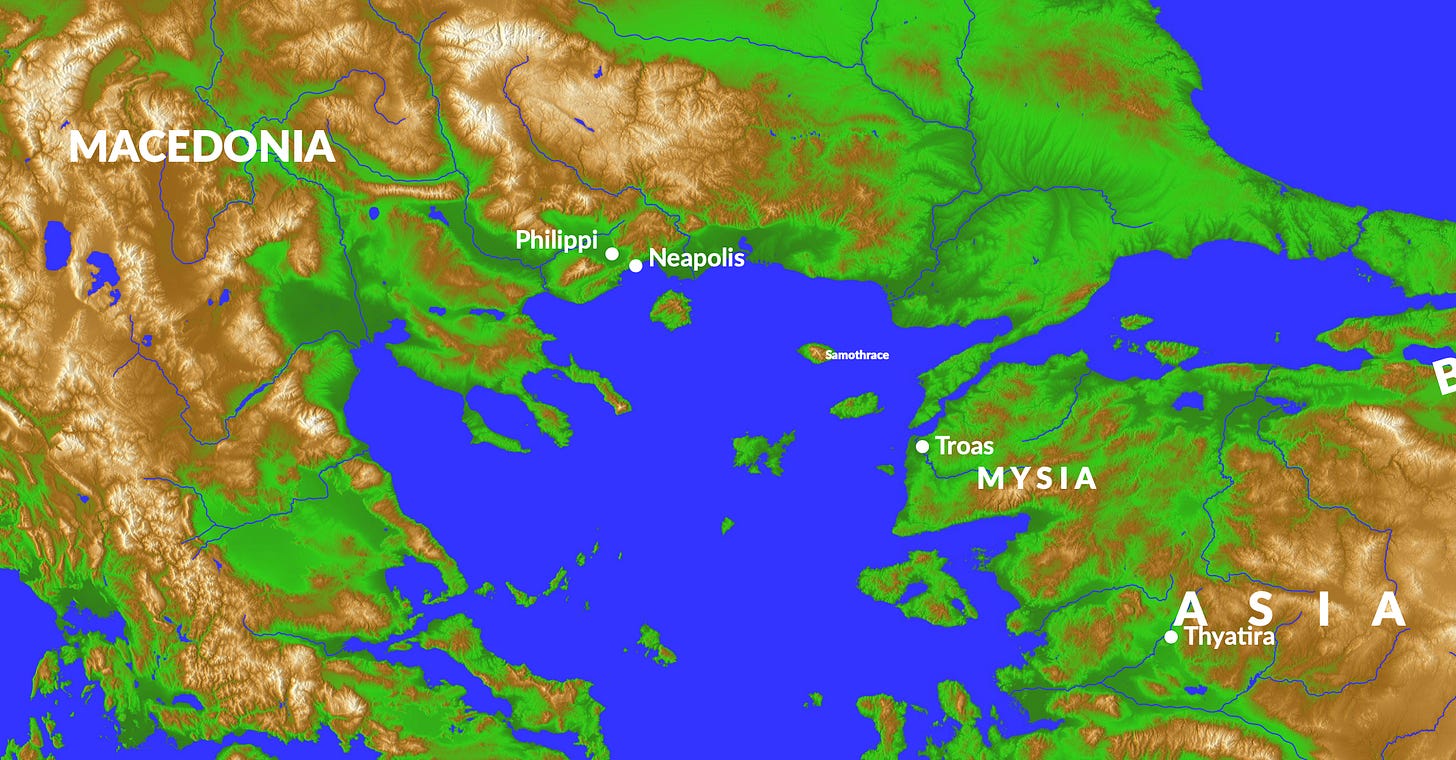Daily Scripture Reading Acts 15:40 - 16:18
If you would start asking evangelists and missionaries about their definition of success, and how many converts they expect to gain per week, month, or year, you will get different responses. Some missionaries work in very hard areas and think one convert a year is successful. For others, their expectations are more like one convert per month or per week.
In many ways, modern Christianity is content with that pace of growth, and it is possible that is the best that can be expected in certain cultures or geographical areas.
However, there is a verse in today’s passage that should cause us to question whether we are too content with the current rate of growth of Christianity. Perhaps we should be expecting more.
We read in Acts 15 that after spending many days in Antioch, Paul suggested to Barnabas that they revisit the churches in every city in which they had done ministry. Barnabas was willing, but he wanted to take John Mark along. Paul did not want to take John Mark since he had abandoned them on the previous journey. They could not agree on this, so they split up. Barnabas took John Mark and went to Cyprus.
Acts 15:40 But Paul chose Silas and left, being committed by the brothers to the grace of the Lord.
Acts 15:41 And he was traveling through Syria and Cilicia, strengthening the churches.
Syria and Cilicia were the geographical areas closest to the city of Antioch, their starting point.
Acts 16:1 ¶ Now Paul also arrived at Derbe and at Lystra. And behold, a disciple was there, named Timothy, the son of a Jewish woman who was a believer, but his father was a Greek,
Paul and Barnabas had visited Derbe and Lystra during their earlier missionary journey.
Notice Timothy’s mother was Jewish, but his father was Greek, meaning Timothy was half Jewish. This will be important in a couple verses.
Acts 16:2 and he was well spoken of by the brothers who were in Lystra and Iconium.
It was roughly 250 miles / 400 km from Antioch to Derbe. This means it would have taken Paul and Silas at least 8 days to get to Derbe, but they had been making stops along the way, so by this time they were weeks into their journey.
Acts 16:3 Paul wanted this man to go with him, and he took him and circumcised him because of the Jews who were in those parts, for they all knew that his father was a Greek.
The words “this man” refer to Timothy. Timothy was half Jewish, but apparently he had not been circumcised. This verse tells us there were Jews in that area and they knew Timothy was not circumcised, so Paul circumcised Timothy so that the Jews would not have any reason to accuse Paul or Timothy of breaking the Mosaic Law.
Acts 16:4 Now while they were passing through the cities, they were delivering the decrees which had been decided upon by the apostles and elders who were in Jerusalem, for them to keep.
Acts 16:5 So the churches were being strengthened in the faith, and were abounding in number daily.
Notice the word “daily”. The missionary and evangelism activity of the early church was so successful, people were becoming believers everyday.
In modern times, we consider it successful if there are converts once a week or once a month. Some missionaries are happy to have one convert per year.
I can believe there are societies where evangelism is so hard, one convert a year is the best that can be expected. However, I also think many in modern Christianity have become complacent and are happy with one convert per week or per month. In light of the success of the early church, perhaps we should not be content with the current growth rate of Christianity.
Before we accept the current pace of growth, we should examine how Paul did ministry and ask whether our lack of daily converts is due to the hardness of the mission field, or whether it is due to the insufficiency of our current methods of evangelism.
Acts 16:6 ¶ And they passed through the Phrygian and Galatian region, having been forbidden by the Holy Spirit to speak the word in Asia;
Note the words “passed through” and “forbidden”. They did not do much preaching in those areas.
Galatia and Phrygia were provinces in the middle of the area known today as the country of Turkey. The colors on the map indicate elevation. Galatia and Phrygia were hilly/mountainous areas, meaning traveling through those areas was difficult. It meant either going up and down mountains or around them.
Acts 16:7 and after they came to Mysia, they were trying to go into Bithynia, and the Spirit of Jesus did not permit them;
It was about 300 miles / 480 km from Lystra to Mysia. That would have taken at least 10 days.
Acts 16:8 and passing by Mysia, they came down to Troas.
Notice the pronoun “they”. Up to this point, Luke, the author of the book of Acts, wrote about Paul and his companions in the 3rd person.
Troas was a city in the region of Mysia and was near the sea.
Acts 16:9 And a vision appeared to Paul in the night: a man of Macedonia was standing and appealing to him, and saying, “Come over to Macedonia and help us.”
Macedonia was a Roman province in the area known today as the country of Greece.
Acts 16:10 And when he had seen the vision, immediately we sought to go into Macedonia, concluding that God had called us to proclaim the gospel to them.
Notice the pronoun “we” At this point, Luke, the author of Acts, began writing in the 1st person, indicating that at this point Luke joined Paul’s group and traveled with them.
Acts 16:11 ¶ So setting sail from Troas, we ran a straight course to Samothrace, and on the day following to Neapolis;
Acts 16:12 and from there to Philippi, which is a leading city of the district of Macedonia, a Roman colony; and we were staying in this city for some days.
This verse ends with the words “for some days”, letting us know that Paul and his group did not just pass through Philippi, they stopped and engaged in significant evangelistic work.
It is about 50 miles / 80 km from Troas to the Island of Samothrace. Then it is about 70 miles / 110 km from Samothrace to Neapolis. It is only about 10 miles / 16km from Neapolis to Philippi. It was a multi-day trip to get from Troas to Philippi.
Acts 16:13 And on the Sabbath day we went outside the gate to a riverside, where we were supposing that there would be a place of prayer; and sitting down, we began speaking to the women who had assembled.
Acts 16:14 And a woman named Lydia, from the city of Thyatira, a seller of purple fabrics, a worshiper of God, was listening, whose heart the Lord opened to pay attention to the things spoken by Paul.
Thyatira was in Asia. It is about 235 miles / 380 km from Thyatira to Philippi. Lydia was a long way from home.
Acts 16:15 And when she and her household had been baptized, she urged us, saying, “If you have judged me to be faithful to the Lord, come into my house and stay.” And she prevailed upon us.
Acts 16:16 ¶ Now it happened that as we were going to the place of prayer, a servant-girl having a spirit of divination met us, who was bringing her masters much profit by fortune-telling.
Acts 16:17 Following after Paul and us, she kept crying out, saying, “These men are slaves of the Most High God, who are proclaiming to you the way of salvation.”
Acts 16:18 And she continued doing this for many days. But being greatly annoyed, Paul turned and said to the spirit, “I command you in the name of Jesus Christ to leave her!” And it left at that very moment.
Note the word “annoyed”. We often think being annoyed is a defect, and it probably often is. However, in this case, annoyance led Paul to cast out a demon which was good for the girl who was causing the annoyance.
We see in this passage that people converted to Christianity everyday.
How were Paul and his companions doing ministry that is different than how we do ministry today, and may be the explanation for why their conversion rate was so much higher than ours?
How many converts does your church expect to gain per week, month, or year?
Is that an acceptable expectation, or is your church too complacent with its current definition of success?
Thanks for visiting Bible Mountain. If you have already joined my email list, thank you and please tell others about Bible Mountain. If you have not joined my email list yet, please do so now. In order to join, go to Bible Mountain dotcom, click on subscribe, and that will take you to a page where you can sign up. Your email address will not be sold nor given away. Once again, thanks for visiting Bible Mountain.
“Scripture quotations taken from the (LSB®) Legacy Standard Bible®, Copyright © 2021 by The Lockman Foundation. Used by permission. All rights reserved. Managed in partnership with Three Sixteen Publishing Inc. LSBible.org and 316publishing.com.”








